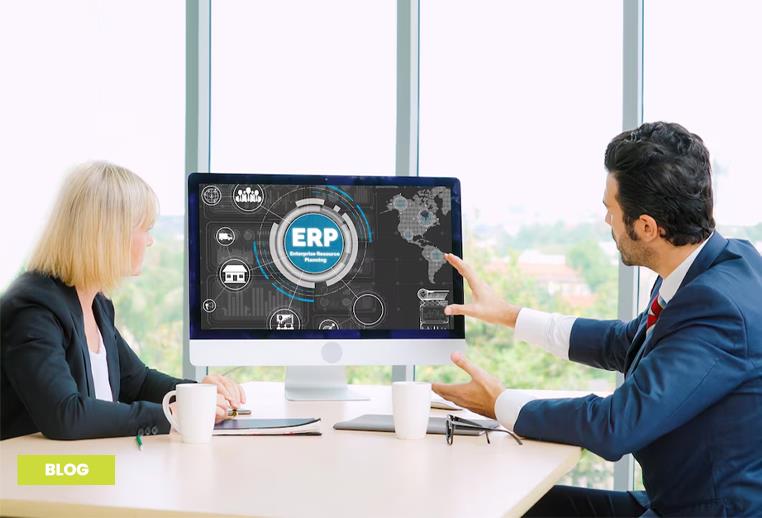What Role Does ERP Implementation Play in Digital Transformation?
16 January, 2025 Digital TransformationIT consulting services
Enterprise Resource Planning (ERP) systems have long been the backbone of organizational efficiency, enabling businesses to streamline operations and centralize data. However, in today’s era of digital transformation, ERP systems have evolved from operational tools to strategic enablers of innovation and growth. A successful ERP implementation can serve as a cornerstone of digital transformation, ensuring businesses are equipped to adapt to the rapidly changing technological landscape.
Let’s take a look at the critical role ERP systems play in driving digital transformation and why involving a digital transformation expert in the implementation process is essential for success.
Key Roles ERP Implementation Plays in Digital Transformation
Centralizing Data for Enhanced Decision-Making
One of the most significant advantages of ERP systems is their ability to centralize data from various departments. During digital transformation, this centralized data repository enables:
- Real-Time Insights: Access to up-to-date information empowers decision-makers to respond quickly to market changes.
- Data-Driven Strategies: Advanced analytics tools integrated with ERP systems can generate actionable insights, driving innovation and efficiency.
Streamlining Business Processes
ERP systems automate and standardize business processes, eliminating redundancies and improving efficiency. This streamlined approach is vital for digital transformation because:
- It frees up resources for innovation.
- It reduces errors, ensuring smooth operations and enhanced customer satisfaction.
A digital transformation expert can identify process bottlenecks and optimize them during ERP implementation, ensuring maximum value is derived from the system.
Enabling Scalability and Flexibility
As businesses grow and adapt to new technologies, ERP systems provide the scalability needed to support this evolution. Modern ERP systems are built to integrate with emerging technologies like artificial intelligence (AI), machine learning (ML), and the Internet of Things (IoT).
For instance:
- AI-driven ERPs can provide predictive analytics.
- IoT integration enables real-time monitoring of assets.
These capabilities ensure businesses remain agile and competitive, a hallmark of successful digital transformation.
Enhancing Customer Experience
Digital transformation prioritizes customer-centric strategies. ERP systems contribute by:
- Providing a 360-degree view of customer interactions.
- Ensuring seamless order fulfillment and support through integrated processes.
- Delivering personalized services based on customer data insights.
By integrating customer relationship management (CRM) tools within an ERP system, organizations can enhance customer engagement and loyalty.
Improving Collaboration Across Teams
ERP systems break down departmental silos, fostering collaboration. During a digital transformation journey, this interconnectedness ensures that all teams work towards shared goals, leveraging data and insights collectively.
- Cross-departmental transparency improves accountability.
- Shared data access accelerates project timelines and enhances coordination.
Ensuring Compliance and Risk Management
Modern ERP systems come with built-in compliance management tools, ensuring adherence to regulations and standards. This is particularly important during digital transformation, as businesses expand into new markets or adopt new technologies.
- Automated compliance tracking minimizes risks.
- ERP-driven audit trails enhance transparency and trust.
Reducing costs and improving ROI
While ERP implementation requires significant investment, the long-term cost savings and return on investment (ROI) can be substantial. By automating routine tasks and optimizing resource utilization, ERP systems:
- Lower operational costs.
- Increase productivity.
- Drive faster time-to-market for new products and services.
A digital transformation expert can ensure that the ERP system is aligned with the organization’s strategic goals, maximizing ROI.
Challenges in ERP Implementation and How to Overcome Them
Resistance to Change
Employees may resist adopting new systems due to fear of the unknown. Overcoming this requires:
- Strong leadership and clear communication.
- Comprehensive training programs.
- Involvement of end users in the implementation process.
Customizing the System to Fit Business Needs
One-size-fits-all solutions rarely work in ERP implementation. Customization can be challenging, but a digital transformation expert can help tailor the system to meet unique business requirements.
Integration with Existing Systems
Integrating an ERP system with legacy software can be complex. Ensuring seamless integration requires:
- A robust implementation strategy.
- Expertise in system compatibility and data migration.
Ensuring Data Security
As ERP systems handle sensitive data, ensuring robust cybersecurity measures is critical. Organizations should:
- Implement encryption and access controls.
- Regularly update and patch software.
The Role of a Digital Transformation Expert in ERP Implementation
Implementing an ERP system as part of a digital transformation strategy requires careful planning and execution. This is where a digital transformation expert adds immense value:
- Strategic Vision: Experts ensure that the ERP implementation aligns with the organization’s long-term goals.
- Change Management: They help manage the cultural shift, ensuring employee buy-in and smooth adoption.
- Technical Expertise: Their knowledge of the latest technologies ensures the ERP system integrates seamlessly with emerging tools and platforms.
- Risk Mitigation: By identifying potential pitfalls, experts minimize implementation risks.
Conclusion
ERP implementation is not just an operational upgrade; it is a strategic move that empowers businesses to navigate the complexities of digital transformation. By centralizing data, streamlining processes, and enabling innovation, ERP systems lay the groundwork for a successful transformation journey.
